Nicola Cornick's Blog, page 38
November 30, 2010
The Strange Case of the Amazon Reviews
I was very interested to read an article on the Daily Mail online site about a row that has broken out about the authenticity of reader reviews on Amazon UK. You can read the article  here if you would like to. In summary, it states that author Rosie Alison became so incensed by a series of critical and in some cases personal one and two star reviews of her book The Very Thought of You that she called in Kwikchex, a company that specialises in protecting online reputations because she suspected that the reviews were part of an orchestrated campaign to denigrate the book. Kwikchex's findings suggested that the "wording and the dates of the postings were indicative of a malicious attack."
here if you would like to. In summary, it states that author Rosie Alison became so incensed by a series of critical and in some cases personal one and two star reviews of her book The Very Thought of You that she called in Kwikchex, a company that specialises in protecting online reputations because she suspected that the reviews were part of an orchestrated campaign to denigrate the book. Kwikchex's findings suggested that the "wording and the dates of the postings were indicative of a malicious attack."
The article also quoted the example of historian Simon Winder who earlier this year forced Amazon to remove a critical review of his book Germania after it was discovered that it had been written by an academic rival.
Further, one PR company freely admits providing favourable reviews of new books: "Nathan Barker, of Reputation 24/7, offers a service starting at £5,000. He said: 'First we set up accounts. For a romance novel we'd pick seven female profiles and three males. We'd say we like this book but add a tiny bit of criticism and compare it to another book.' He claims that this is common practise amongst publishers."
Who would have thought it? Well, I would for a start. I'm not a cynic (I'm a romantic!) but surely any organisation such as Amazon that allows anonymous reviews and has no system of checking whether reviewers are authentic or have a vested interest is going to be open to exploitation. Whilst no doubt the vast majority of comments are genuine, sadly some will not be. Any academic with a delicate ego or thwarted writer with a grudge is able to post a review up there if they wish. And some do, just as Mr Barker's comments confirm that for the right price you can buy a good Amazon review as well.
I was brought up in an old-fashioned way that can be summarised in this context as "if you don't have anything nice to say, then don't say anything." However, not everyone is like me and why should they be? If people dislike my books (and some are bound to – you can't please everyone) then they have a perfect right to say so, in public if they wish. To paraphrase Voltaire, I might not like what they say but I defend to the death (well, almost, let's be reasonable here) their right to say it. Last year I was very bruised by some reviews my books garnered on Amazon. My response was not to read Amazon reviews any more and to develop a thicker skin. I'm now as impervious as a rhino and approaching elephant hide. No, actually, I'm not, because the books are very personal to me but if someone doesn't like my writing I'm not going to obsess about it. I'll have a cup of tea and eat a cream cake instead.
Oh, and I can't afford £5000 to pay for people to write fake positive reviews for me on Amazon and if I had that sort of spare cash I wouldn't spend it on that anyway.
I took a look at some of the reviews of Ms Alison's book on Amazon and was not surprised that many of the critical ones were written by people exercising their so-called literary credentials by comparing the book unfavourably with romance novels. Yawn. That's a cliché I haven't read before. The book sounds a great read to me. Given the dreadful stilted language in some of the books up for the Bad Sex Award this week, readers should be embracing romance novels as written by people who actually know how to write good sex. The winning entry compared lovemaking to "a lepidopterist mounting a tough-skinned insect." Yikes.
©2010 Nicola Cornick. All Rights Reserved.
.November 29, 2010
The Beaver!
A word today about the UK history of the beaver, because I read some interesting stuff on this at the weekend and wanted to share!
In medieval England a beaver pelt was worth the equivalent of three years wages to a peasant labourer. The importance of beaver meat was shown by the church's decision to classify them as fish, which meant that they could be eaten on a Friday and during Lent.
Beavers were prized for their fur, their meat and a glandular secretion called castoreum which was famous for its medicinal and pain-relieving qualities. It was said to cure earache, constipation, toothache, sores and ulcers. As a result of their popularity, the beaver had been hunted to extinction in the British Isles by the 17th century. Their soft under-fur was used in the making of the waterproof beaver hat.
In 1860 a fashion for "acclimatisation societies" saw the first re-introduction of the beaver into Suffolk. Unfortunately the dams they created were deemed to be an eyesore and were destroyed. Another beaver release in the 1890s on the Isle of Bute also failed. There are currently beavers in Scotland and in the Cotswolds.
©2010 Nicola Cornick. All Rights Reserved.
.November 27, 2010
In Praise of the Red-Headed Hero!
Okay, I'll lay my cards on the table here. I LOVE red hair and I've always wanted to be a redhead myself. Sadly in my family the red-haired gene goes every second generation and I was  the one in between so I ended up with "mouse" instead. Maybe that's why I have written a number of red-haired heroines in my books and secretly wanted to be them.
the one in between so I ended up with "mouse" instead. Maybe that's why I have written a number of red-haired heroines in my books and secretly wanted to be them.
Red-headed heroines are something of a staple in historical romance. Usually they are feisty and wilful. People complain this is a stereotype but if it is, there is enough truth in it to be defensible. Both my mother and my mother-in-law are redheads and they are both "spirited" women and I don't think they would mind me saying so! Red-haired heroines are generally gorgeous.
 But when it comes to the red-headed man, the hero with auburn hair, it seems to be a different matter. There don't seem to be many of them. Some readers say they don't find them attractive. And in real life in the UK – and maybe elsewhere – there's sometimes a nasty prejudice called gingerism that makes fun of people with red hair. (There are also people who make blonde jokes as well, of course.) So when it came to writing Mistress By Midnight and I realised that I was imagining Garrick, my hero, as a man with auburn hair and brown eyes, I was in a bit of a quandary. Should I change his hair colour to black instead? Or should I stand up for the red-haired hero and say "this guy is gorgeous"? I decided to go with the latter. But what do YOU think? Are you a fan of the red-haired hero or do they not work for you? Are there any books or films you enjoyed that featured a ginger hero? (It's the word ginger, isn't it – fine for the spice, not so good to describe a hair colour). Do you think it's because there are so few good-looking redheaded male actors or celebrities around to inspire us? Am I alone in my fixation with red hair? Tell me what you think!
But when it comes to the red-headed man, the hero with auburn hair, it seems to be a different matter. There don't seem to be many of them. Some readers say they don't find them attractive. And in real life in the UK – and maybe elsewhere – there's sometimes a nasty prejudice called gingerism that makes fun of people with red hair. (There are also people who make blonde jokes as well, of course.) So when it came to writing Mistress By Midnight and I realised that I was imagining Garrick, my hero, as a man with auburn hair and brown eyes, I was in a bit of a quandary. Should I change his hair colour to black instead? Or should I stand up for the red-haired hero and say "this guy is gorgeous"? I decided to go with the latter. But what do YOU think? Are you a fan of the red-haired hero or do they not work for you? Are there any books or films you enjoyed that featured a ginger hero? (It's the word ginger, isn't it – fine for the spice, not so good to describe a hair colour). Do you think it's because there are so few good-looking redheaded male actors or celebrities around to inspire us? Am I alone in my fixation with red hair? Tell me what you think!
©2010 Nicola Cornick. All Rights Reserved.
.November 25, 2010
Winners!
It's winners day here on the blog! Congratulations to Earlene, who has won my November Website Contest of a set of the  Brides of Fortune trilogy and another set to send as a gift. Don't miss the December contest – there's more Brides of Fortune books up for grabs plus a copy of Laurel McKee's fabulous historical romance Duchess of Sin!
Brides of Fortune trilogy and another set to send as a gift. Don't miss the December contest – there's more Brides of Fortune books up for grabs plus a copy of Laurel McKee's fabulous historical romance Duchess of Sin!
Meanwhile on the blog, Stephanie, Emma S and Suzi have all won copies of The Heart of Christmas. Congratulations!
Thank you to everyone who has entered the contests and stopped by the blog for a chat. It's lovely to hear from you all! A big thank you too for buying my new series and giving me such encouragement in my writing. I appreciate it very much.
Today on the Word Wenches Blog I am interviewing Laurel McKee about the fascinating historical background to Duchess of Sin and there are yet more books to be won!
A very Happy Thanksgiving to all my American friends and to all my UK ones, wrap up and keep warm in this snowy weather. Wherever you are in the world, have a great day!
Happy reading!
Nicola
©2010 Nicola Cornick. All Rights Reserved.
.November 22, 2010
It's Midnight!
Midnight: Dictionary definition: " The transition in time period from one day to the next."
I've always been fascinated by the word and the idea of midnight. When I was a child I used to lie awake on the night before my birthday waiting for the clock in the hall to chime 12. I 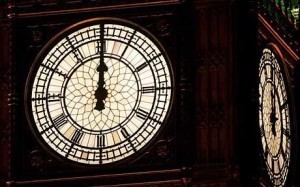 loved all the stories with Midnight in the title – the idea of creeping outside into Tom's Midnight Garden and finding my way between vast hedges of yew by the light of the moon absolutely thrilled me. In The Moon of Gomrath by Alan Garner the midnight sky was alive with magic and I wanted to be running along that old straight track by the light of the moon with the children in the story.
loved all the stories with Midnight in the title – the idea of creeping outside into Tom's Midnight Garden and finding my way between vast hedges of yew by the light of the moon absolutely thrilled me. In The Moon of Gomrath by Alan Garner the midnight sky was alive with magic and I wanted to be running along that old straight track by the light of the moon with the children in the story.
In magic, midnight refers to solar midnight, the moment when darkness is at its height and light at its lowest ebb. This is the moment when the human world is linked to other worlds. Midnight is associated with chaos, death, the underworld and mystery. It is the time when visits from ghosts, demons and devils are supposed to be common and all the supernatural creatures of darkness have their greatest potency. This is the time when vampires arise from their graves to suck the blood of mortals and it is dangerous to look in the mirror in case the devil looks back at you. But it is also the time to gather the ingredients used in white magic as various herbs were thought to be most potent when harvested at midnight.
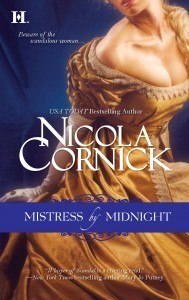 So I am hoping for a little bit of happy magic to be sprinkled on book 3 of my trilogy, Mistress by Midnight, which is out tomorrow. With a deep midnight blue cover I think it looks gorgeous! In Mistress by Midnight, Merryn faces her own demons when she is trapped with Garrick, the hero, through a long dark night and has to question everything that is important to her, everything that she believes in. The word midnight to me is rich and romantic and magical. I've done my utmost to make the book all those things too.
So I am hoping for a little bit of happy magic to be sprinkled on book 3 of my trilogy, Mistress by Midnight, which is out tomorrow. With a deep midnight blue cover I think it looks gorgeous! In Mistress by Midnight, Merryn faces her own demons when she is trapped with Garrick, the hero, through a long dark night and has to question everything that is important to her, everything that she believes in. The word midnight to me is rich and romantic and magical. I've done my utmost to make the book all those things too.
©2010 Nicola Cornick. All Rights Reserved.
.November 19, 2010
UK Publication of The Heart of Christmas!
Today is UK publication day for The Heart of Christmas anthology! Not just that, but I hear that the book is also available in Australia under the title of A Regency Christmas. Thank you to reader Jennifer for letting me know! And in Holland the Dutch translation of The Undoing of a Lady has been published. Thank you to Renee for telling me about that one. I adore the cover (below)! If you have a sighting of one of my books where you are, please let me know as I am always thrilled to hear about my books around the world. I can vicariously enjoy their travels!
you to reader Jennifer for letting me know! And in Holland the Dutch translation of The Undoing of a Lady has been published. Thank you to Renee for telling me about that one. I adore the cover (below)! If you have a sighting of one of my books where you are, please let me know as I am always thrilled to hear about my books around the world. I can vicariously enjoy their travels!
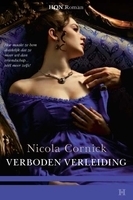 So does the release of a Christmas anthology mean that it is now officially Christmas? I hope not because I am not quite ready yet! When I was up in London for the fabulous RNA Winter Party this week the Christmas lights were twinkling and it was almost cold enough to snow. But there are still presents to be bought and I have to venture up into the attic to excavate the Christmas decorations. I like to wait until the beginning of December before I decorate the tree and get the cat's antlers out.
So does the release of a Christmas anthology mean that it is now officially Christmas? I hope not because I am not quite ready yet! When I was up in London for the fabulous RNA Winter Party this week the Christmas lights were twinkling and it was almost cold enough to snow. But there are still presents to be bought and I have to venture up into the attic to excavate the Christmas decorations. I like to wait until the beginning of December before I decorate the tree and get the cat's antlers out.
Are you one of those people who is so well organised that you have all your presents bought months in advance? Or are you a last minute Christmas Eve shopper?  Do you think the middle of November is too early to start celebrating Christmas? If you do, I have three copies of The Heart of Christmas to give away to help you get into the spirit of things! Simply tell me your favourite Christmas tradition, why you love the festive season – or why you don't!
Do you think the middle of November is too early to start celebrating Christmas? If you do, I have three copies of The Heart of Christmas to give away to help you get into the spirit of things! Simply tell me your favourite Christmas tradition, why you love the festive season – or why you don't!
©2010 Nicola Cornick. All Rights Reserved.
.November 17, 2010
Month of Thanks
 This month I am very honoured to be part of the Romance in the Backseat Month of Thanks. When Terry invited me to blog about something for which I was particularly grateful, I was kind of spoiled for choice. I consider myself to be a very fortunate person. I have family and friends who love and support me, I have a gorgeous dog and a bad-tempered but still adorable cat, I have interests that enrich my life and I have my writing and my wonderful readers. Like many people I also have difficult personal, health and family issues to deal with sometimes and these can cause stress and unhappiness. At such times it's important that we all know we are part of a wider community that even in these busy times is there for us. I appreciate so much all the good things in my life and hope I am also there for the people who need me.
This month I am very honoured to be part of the Romance in the Backseat Month of Thanks. When Terry invited me to blog about something for which I was particularly grateful, I was kind of spoiled for choice. I consider myself to be a very fortunate person. I have family and friends who love and support me, I have a gorgeous dog and a bad-tempered but still adorable cat, I have interests that enrich my life and I have my writing and my wonderful readers. Like many people I also have difficult personal, health and family issues to deal with sometimes and these can cause stress and unhappiness. At such times it's important that we all know we are part of a wider community that even in these busy times is there for us. I appreciate so much all the good things in my life and hope I am also there for the people who need me.
In my blog piece at Romance in the Backseat I talk about my grandmother, what a special person she was and how wonderful it is to have had her in my life. Other authors are talking about the things for which they give thanks. Romance in the Backseat is giving away some awesome gifts – not only books donated by the authors who are taking part but also gifts of food and grocery store gift vouchers. You can read all about it here, browse the author posts and nominate someone in your life whom you would like to thank with a book.
©2010 Nicola Cornick. All Rights Reserved.
.November 15, 2010
The Scouring of the White Horse
Today was a beautiful sunny autumn day up on White Horse Hill, with the mist lying across the Vale like a fluffy blanket but a warm sun beating down on us as we stood on the top of the  hill. Monty and I had a fabulous walk!
hill. Monty and I had a fabulous walk!
At the end of One Wicked Sin, when Lottie floats off to her happy ending, she is at a country fair in Oxfordshire. A lot of One Wicked Sin is set in the market town of Wantage, close to where I live, and the fair at Uffington that features in the book is based on the ancient local tradition of the Scouring of the White Horse. The White Horse is an ancient figure cut in the chalk hillside. It's an iconic site and in order to keep it bright white the chalk is cleaned every year. This process is called scouring, as one would scour a pan, and in previous centuries it was part of a festival that went on for several days. Here is a description of the fair from the nineteenth century:
"There were flower-bedecked booths and stalls selling nuts, apples, gingerbread, toys, ribbons, knives, braces, straps and other trifles. There were musicians and acrobats, a publican's booth and a skittle alley. Competitions included climbing a greasy pole, sack racing, cheese rolling, cudgel play, find the silver bullet in the flour and a pipe-smoking marathon. Prizes ranged from a gold-laced hat to half-a-guinea or a gallon of gin. Although the original purpose of the celebration was essentially religious, revelry had all but taken over."
 The time of year was also not static. Whitsun & Michaelmas were both popular. Michaelmas appears to be the older date and may therefore be related to ancient fire festivals held around this time. Earlier references, however, suggest the midsummer solstice as the original festive season at Uffington. This was a time for burning bonfires and fumigating cattle. The old midsummer rites involved flaming bales of hay, tar barrels and straw-packed sun wheels (see left) which were chased down the hillside. Such activities were designed to help boost the sun around the bend of the year. Jackson's Oxford Journal of 1780 records these and other games.
The time of year was also not static. Whitsun & Michaelmas were both popular. Michaelmas appears to be the older date and may therefore be related to ancient fire festivals held around this time. Earlier references, however, suggest the midsummer solstice as the original festive season at Uffington. This was a time for burning bonfires and fumigating cattle. The old midsummer rites involved flaming bales of hay, tar barrels and straw-packed sun wheels (see left) which were chased down the hillside. Such activities were designed to help boost the sun around the bend of the year. Jackson's Oxford Journal of 1780 records these and other games.
These days there is no longer a Scouring Festival although the White Horse Show is a lot of fun. It's nice to think of it as a continuation of those ancient rituals and that those of us who live under the shadow of the White Horse still mark the turning of the year just as our predecessors did.
©2010 Nicola Cornick. All Rights Reserved.
.November 11, 2010
Love and War
Today, to commemorate Armistice Day here in the UK and other events around the world in honour of those who gave their lives in war, I would like to quote a traditional song 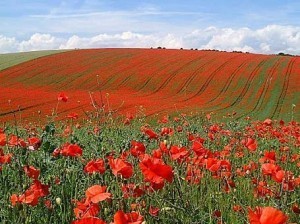 from the Napoleonic Wars that reflects a lot of the emotions surrounding love and sacrifice that are still as real and poignant today as they were 200 years ago. The song is Love Farewell and it was first composed for soldiers fighting under Wellington in the Peninsular.
from the Napoleonic Wars that reflects a lot of the emotions surrounding love and sacrifice that are still as real and poignant today as they were 200 years ago. The song is Love Farewell and it was first composed for soldiers fighting under Wellington in the Peninsular.
Love Farewell
I thought I heard the Colonel crying
March brave boys there's no denying
Cannons roaring – drums abeating
March brave boys there's no retreating
Love Farewell
If I should fall in far off battle
Cannons roar and rifles rattle
Thoughts fly homeward – words unspoken
Valiant hearts are oftimes broken
Love Farewell
Will you go or will you tarry
Will you wait or will you marry
Would this moment last for ever
Kiss me now and leave me never
Love Farewell
I thought I heard the Colonel crying
March brave boys there's no denying
Cannons roaring – drums abeating
March brave boys there's no retreating
Love Farewell
 This song was much in my mind when I wrote One Wicked Sin, with its background of war and imprisonment. I played it often; there is a version by John Tams, who featured as Rifleman Daniel Hagman in the Sharpe television series, accompanied by the Band and Bugles of the Rifles regiment. The song is available from the Help for Heroes website. It is a beautiful tribute to all those who make the ultimate sacrifice for their country and for the principles and people they believe in.
This song was much in my mind when I wrote One Wicked Sin, with its background of war and imprisonment. I played it often; there is a version by John Tams, who featured as Rifleman Daniel Hagman in the Sharpe television series, accompanied by the Band and Bugles of the Rifles regiment. The song is available from the Help for Heroes website. It is a beautiful tribute to all those who make the ultimate sacrifice for their country and for the principles and people they believe in.
©2010 Nicola Cornick. All Rights Reserved.
.November 8, 2010
The Last Invasion of Britain
I'm back from a fabulous week's holiday in Wales, staying in a little cottage on the Pembrokeshire coast, a hundred yards from the beach. Monty adored swimming in the sea and loved  all the walks we took on the Pembrokeshire Cliff Path and in the National Park. He was slightly less keen on the ruined Norman castles but I was very grateful to CADW, who allow well-behaved dogs on leads into their properties.
all the walks we took on the Pembrokeshire Cliff Path and in the National Park. He was slightly less keen on the ruined Norman castles but I was very grateful to CADW, who allow well-behaved dogs on leads into their properties.
One of the places I enjoyed visiting the most was the town of Fishguard, where we saw the tapestry made in 1997 to commemorate the bi-centenary of the last invasion of Britain. This took place in February 1797 and was the last time that a foreign military force was successful in landing on British soil, albeit the invasion itself was an abject failure. The invasion force consisted of 1400 troops from Napoleon's Legion Noire (The Black Legion) so called because they wore the uniforms of captured British soldiers dyed dark brown or black. They were led by an Irish American colonel, William Tate, who had fought against the British during the American War of Independence. The fact that Tate was one of Napoleon's colonels fascinated me because in my current book, One Wicked Sin, I have an Irish hero who has been fighting for the French. Tate's background and that of his troops confirmed the research I had done, which showed that a number of officers in the French army were Irish, supporters of Irish republicanism under politician and revolutionary, Wolfe Tone.
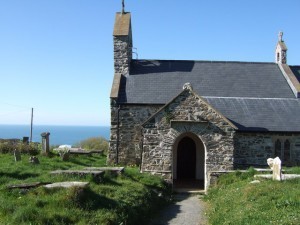 Tate's force consisted of 800 regular troops plus another 600 deserters, convicts and Royalist prisoners. They sailed in four ships of the French Navy, two frigates, La Vengeance and La Resistance, a corvette La Constance and a small Lugger, Le Vauteur, the fleet under the command of Commodore Castagnier. Despite the fact that the invasion descended into chaos, it was no poorly planned or undermanned expedition; it was a serious attempt at invasion and the troops were well-armed. The initial plan was to land the men at Bristol and raze the city to the ground before marching North to take Chester and Liverpool. However adverse weather and the treacherous tides in the Severn Estuary forced the fleet to land their men in West Wales instead. Although the fleet was flying British Colours they were spotted off the coast of Pembrokeshire by a retired sailor who raised the alarm. An attempt to land in Fishguard was driven off by cannon from the fort and so the fleet landed 3 miles away in the bay at Carregwasted under the cover of darkness. They began to move inland and Tate established his headquarters at Trehowel Farm, Llanwnda. The French forces had been instructed to live off the land and this was where things started to unravel. The convicts and pressed men deserted as soon as they set foot on British soil and began to loot local villages and hamlets. One group broke into Llanwnda Church (above) to hide and burned the bible and the pews to keep warm.
Tate's force consisted of 800 regular troops plus another 600 deserters, convicts and Royalist prisoners. They sailed in four ships of the French Navy, two frigates, La Vengeance and La Resistance, a corvette La Constance and a small Lugger, Le Vauteur, the fleet under the command of Commodore Castagnier. Despite the fact that the invasion descended into chaos, it was no poorly planned or undermanned expedition; it was a serious attempt at invasion and the troops were well-armed. The initial plan was to land the men at Bristol and raze the city to the ground before marching North to take Chester and Liverpool. However adverse weather and the treacherous tides in the Severn Estuary forced the fleet to land their men in West Wales instead. Although the fleet was flying British Colours they were spotted off the coast of Pembrokeshire by a retired sailor who raised the alarm. An attempt to land in Fishguard was driven off by cannon from the fort and so the fleet landed 3 miles away in the bay at Carregwasted under the cover of darkness. They began to move inland and Tate established his headquarters at Trehowel Farm, Llanwnda. The French forces had been instructed to live off the land and this was where things started to unravel. The convicts and pressed men deserted as soon as they set foot on British soil and began to loot local villages and hamlets. One group broke into Llanwnda Church (above) to hide and burned the bible and the pews to keep warm.
By the morning of 23 February the French had moved two miles inland and occupied strong defensive positions on the high rocky outcrops of Garnwnda and Gangelli giving an 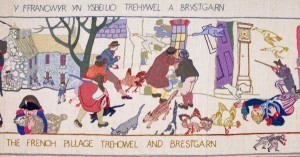 unobstructed view of the surrounding countryside. However discipline had collapsed amongst the convicts when they had discovered that a Portuguese ship had been shipwrecked on the nearby coast a few weeks previously and the locals had stashed away all the wine on board. The convicts rebelled, mutinied and got blind drunk or simply ran away. Morale was low. Meanwhile the British, although outnumbered, with forces of only 300 reservists, 250 militia and 150 sailors from two revenue cutters, had decided to attack. The Welsh local population were not particularly friendly either and had already been involved in skirmishes with the French – they flooded into Fishguard volunteering to fight alongside the troops. Welsh heroine of the hour was Jemima Nicholas, who rounded up a dozen French soldiers armed only with her pitchfork and imprisoned them in St Mary's Church. Late that day the British troops under the command of Lord Cawdor advanced on the French position at Gangelli but withdrew in the failing light. They had narrowly missed walking into a French ambush.
unobstructed view of the surrounding countryside. However discipline had collapsed amongst the convicts when they had discovered that a Portuguese ship had been shipwrecked on the nearby coast a few weeks previously and the locals had stashed away all the wine on board. The convicts rebelled, mutinied and got blind drunk or simply ran away. Morale was low. Meanwhile the British, although outnumbered, with forces of only 300 reservists, 250 militia and 150 sailors from two revenue cutters, had decided to attack. The Welsh local population were not particularly friendly either and had already been involved in skirmishes with the French – they flooded into Fishguard volunteering to fight alongside the troops. Welsh heroine of the hour was Jemima Nicholas, who rounded up a dozen French soldiers armed only with her pitchfork and imprisoned them in St Mary's Church. Late that day the British troops under the command of Lord Cawdor advanced on the French position at Gangelli but withdrew in the failing light. They had narrowly missed walking into a French ambush.
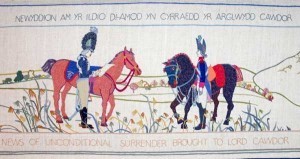 That evening, two French Officers arrived at the Royal Oak Inn in Fishguard Market Square, where Cawdor had set up his headquarters. They wanted to negotiate a conditional surrender but Cawdor played a very cool bluff. Claiming to have a superior numbers of troops he issued an ultimatum to Tate, stating that he would only accept the unconditional surrender of the French forces. Tate had until 10am the following morning to surrender on Goodwick Sands or Cawdor's men would attack. The following morning, at 8am on the 24th February 1797, the British forces lined up in battle-order on Goodwick Sands. Up above them on the cliffs, the inhabitants of the town had come to watch and await Tate's response to the ultimatum. It is said that the French mistook the red cloaks of the Welsh women for more British troops in their red uniform and so thought themselves outnumbered. Tate surrendered and at 2pm the French drums led the column down to Goodwick. They piled their weapons and were marched away through Fishguard to prison. Later a group of prisoners made a daring escape from the Golden Prison in Pembroke by stealing Lord Cawdor's yacht. It is said that they were helped by two local women who had fallen for the charms of two of the French officers and who ran off and married them.
That evening, two French Officers arrived at the Royal Oak Inn in Fishguard Market Square, where Cawdor had set up his headquarters. They wanted to negotiate a conditional surrender but Cawdor played a very cool bluff. Claiming to have a superior numbers of troops he issued an ultimatum to Tate, stating that he would only accept the unconditional surrender of the French forces. Tate had until 10am the following morning to surrender on Goodwick Sands or Cawdor's men would attack. The following morning, at 8am on the 24th February 1797, the British forces lined up in battle-order on Goodwick Sands. Up above them on the cliffs, the inhabitants of the town had come to watch and await Tate's response to the ultimatum. It is said that the French mistook the red cloaks of the Welsh women for more British troops in their red uniform and so thought themselves outnumbered. Tate surrendered and at 2pm the French drums led the column down to Goodwick. They piled their weapons and were marched away through Fishguard to prison. Later a group of prisoners made a daring escape from the Golden Prison in Pembroke by stealing Lord Cawdor's yacht. It is said that they were helped by two local women who had fallen for the charms of two of the French officers and who ran off and married them.
The French naval squadron did not fare much better than the ground troops. On 9th March 1797 Sir Harry Neale of HMS St Fiorenzo and Captain John Cooke in HMS Nymphe 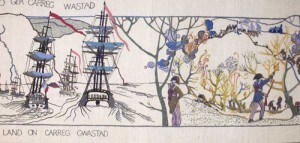 encountered La Resistance and La Constance, which had been crippled in bad weather off Ireland. Cooke and Neale engaged the ships for half and hour, after which both ships surrendered. La Resistance was re-fitted and renamed HMS Fisguard and La Constance became HMS Constance. Commodore Castagnier, on board Le Vengeance, made it safely back to France.
encountered La Resistance and La Constance, which had been crippled in bad weather off Ireland. Cooke and Neale engaged the ships for half and hour, after which both ships surrendered. La Resistance was re-fitted and renamed HMS Fisguard and La Constance became HMS Constance. Commodore Castagnier, on board Le Vengeance, made it safely back to France.
This whole story is told in stunning visual detail in the tapestry. The exhibition also gives the bigger picture in the country at the time; everyone was on high alert against the possibilities of a Frech invasion and the population was very jittery. When the invasion happened the British economy was within hours of crashing. Only some cool heads in London and the speedy defeat of the French troops prevented the country from going bankrupt.
In 1853, amidst fears of another invasion by the French, Lord Palmerston conferred upon the Pembroke Yeomanry the battle honour "Fishguard". This regiment has the unique honour of being the only Regiment in the British Army, regular or territorial, that bears a battle honour for an engagement on the British mainland. It was also the first battle honour awarded to a Volunteer Unit.
In 2003 divers discovered the wreck of one of the boats that had been used to ferry troops and ammunition from the French fleet to the mainland.
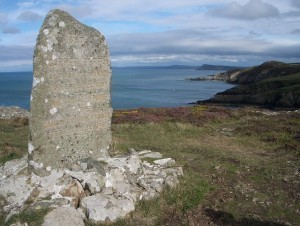 After we had seen the tapestry on display at Fishguard Town Hall we went out to Llanwnda to see where the French had made their HQ and where they had looted and burned the church. We had intended to go for a walk to Carregwasted to see the memorial stone at the landing place but the weather was so bad by now that instead we went home for Welsh cakes and tea! The Last Invasion tapestry is a superb piece of work and I would encourage anyone visiting West Wales to drop by and see this wonderful exhibition. And I think there is definitely inspiration for a book in there somewhere…
After we had seen the tapestry on display at Fishguard Town Hall we went out to Llanwnda to see where the French had made their HQ and where they had looted and burned the church. We had intended to go for a walk to Carregwasted to see the memorial stone at the landing place but the weather was so bad by now that instead we went home for Welsh cakes and tea! The Last Invasion tapestry is a superb piece of work and I would encourage anyone visiting West Wales to drop by and see this wonderful exhibition. And I think there is definitely inspiration for a book in there somewhere…
©2010 Nicola Cornick. All Rights Reserved.
.


